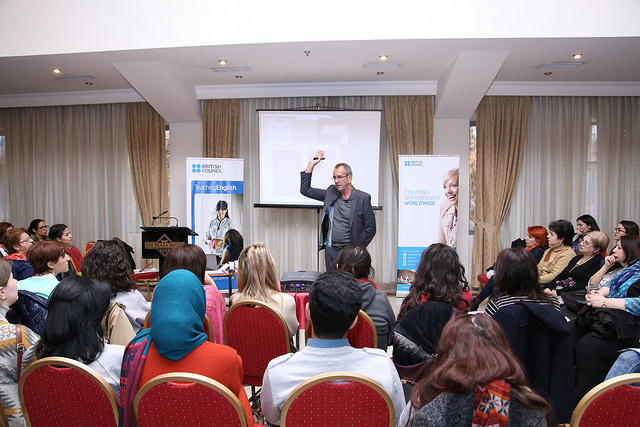
During this annual event, English language teachers are given the opportunity to attend a series of talks delivered by a distinguished ELT expert and develop professionally.
During his visit, Scott Thornbury, delivered five sessions over three days to English language teachers from all educational sectors in Armenia as well as international participants from Iran, Georgia, Singapore, and Russia. All the sessions were live-streamed to participants from all over the globe. Presentations were mapped to the British Council’s Teaching for Success professional practices to raise awareness of our CPD framework.
You can watch four of the talks given by Scott by clicking on the links below:
Seven Things beginning with M
A truism that no single method is going to meet the needs of all teachers and all learners, either locally or globally. Hence, we now operate in what is called the post-method era. Yet methods formerly provided teachers with a certain sense of security, a role which perhaps coursebooks now fulfil. This security is illusory, though, if it is not grounded in some basic principles of learning and education, principles that I will attempt to identify, and which (I will argue) constitute a blueprint for a coherent approach to language teaching.
Link to the recording of this talk: https://www.youtube.com/watch?v=raMaoADLqcM
Teaching Unplugged
Teachers, I will argue, could learn a lesson from the Dogme 95 group of film makers, who have pledged to rid film-making of an obsessive concern for technique and to rehabilitate a cinema which foregrounds the story, and the inner life of the characters. In a similar spirit, I will be putting the case for what is called "a pedagogy of bare essentials": one in which dependence on imported materials is reduced, and in which the learners’ texts and meanings are foregrounded. I will be looking at practical ways of achieving these goals.
Link to the recording of this talk: https://www.youtube.com/watch?v=hBLCdTCnlRU
The Secret History of Methods
I’m regularly asked “What’s the latest method?”, suggesting that the concept of method persists, despite recent attempts to bury it (“The method concept is dead!”). I will review the history of methods, both to critique it, and to draw some lessons from past methods, arguing (a) there is nothing new under the sun and (b) dogme is not a method!
Link to the recording of this talk: https://www.youtube.com/watch?v=8etZGNFqQdI
Ed tech: the mouse that roared
Despite a paucity of evidence to show that digital technology enhances language learning, the fever for new tools and apps continues unabated. Moreover, each innovation arrives garlanded with promises that are seldom if ever fulfilled, such that the history of educational technology in the 20th century has been characterised as a continuous cycle of ‘hype, hope, and disappointment’ (Selwyn 2011, p. 59). To guard against the hype and to avoid disappointment, the vigilant teacher needs to ask: What is the problem for which this technology is the solution? In this talk I reduce language learning to six ‘problems’ and evaluate the solutions that technology offers.
Link to the recording of this talk: https://www.youtube.com/watch?v=Lg9M45iUAys&t=56s